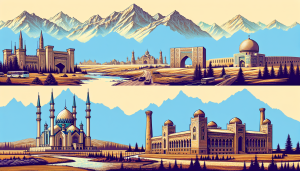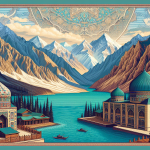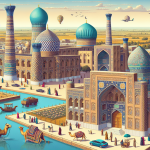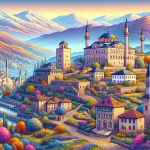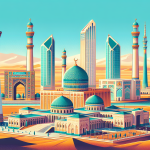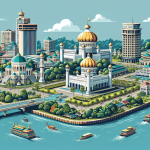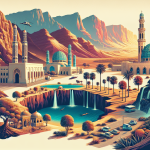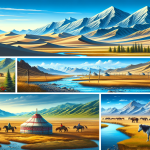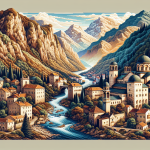Kazakhstan: A Land of Unparalleled Beauty and Rich Culture
Kazakhstan, the world’s ninth-largest country, offers a treasure trove of diverse landscapes, rich cultural heritage, and a fascinating blend of modernity and tradition. Nestled in Central Asia, this vast nation invites travelers to explore its sprawling steppes, majestic mountains, vibrant cities, and ancient Silk Road routes. Despite its impressive size and wealth of attractions, Kazakhstan remains a relatively undiscovered gem on the global tourism map. This article aims to shed light on the myriad wonders of Kazakhstan, from its bustling capital, Nur-Sultan (formerly Astana), to the natural splendors of the Altai Mountains and the haunting beauty of the Aral Sea. Whether you are an adventure seeker, a history buff, or simply looking to experience a unique culture, Kazakhstan promises an unforgettable journey. Join us as we delve into the heart of this remarkable country, uncovering the best places to visit, activities to enjoy, and cultural experiences that await you.
Exploring the Vibrant Cities of Kazakhstan
Nur-Sultan: The Modern Marvel
Nur-Sultan, Kazakhstan’s capital, is a testament to the country’s rapid modernization and ambitious vision for the future. This bustling city, which was renamed from Astana in 2019, boasts an array of futuristic architecture, wide boulevards, and cultural landmarks that make it a must-visit destination.
- Bayterek Tower: One of the city’s most iconic structures, Bayterek Tower symbolizes a poplar tree holding a golden egg, representing a Kazakh legend. Visitors can ascend to the observation deck for panoramic views of the city.
- Khan Shatyr: This unique structure, designed by British architect Norman Foster, is the world’s largest tent and houses a shopping mall, indoor beach, and various entertainment options.
- Palace of Peace and Reconciliation: Another architectural marvel by Foster, this pyramid-shaped building hosts conferences, exhibitions, and cultural events. Its design symbolizes unity and peace.
Almaty: The Cultural Heart
Almaty, Kazakhstan’s largest city, was its capital until 1997 and remains the cultural and economic hub of the country. Nestled at the foot of the Trans-Ili Alatau mountains, Almaty offers a blend of Soviet-era architecture, modern amenities, and natural beauty.
- Zenkov Cathedral: Also known as Ascension Cathedral, this stunning wooden structure is one of the tallest wooden buildings in the world and a testament to Almaty’s rich history.
- Green Bazaar: A bustling marketplace where you can sample local delicacies, buy fresh produce, and experience the vibrant atmosphere of Kazakh commerce.
- Kok-Tobe Hill: Take a cable car ride to the top of Kok-Tobe Hill for breathtaking views of Almaty and the surrounding mountains. The hill also features a mini zoo, amusement park, and restaurants.
The Natural Wonders of Kazakhstan
Charyn Canyon: Kazakhstan’s Grand Canyon
Located about 200 kilometers east of Almaty, Charyn Canyon is often referred to as the “Grand Canyon of Kazakhstan.” This stunning natural wonder stretches over 80 kilometers and features striking rock formations, deep gorges, and a river that carves its way through the landscape.
- Valley of Castles: One of the most famous sections of Charyn Canyon, the Valley of Castles is known for its towering rock formations that resemble ancient fortresses.
- Eco Park: For those looking to spend more time in the canyon, the Charyn Canyon Eco Park offers camping facilities, guided tours, and various outdoor activities.
Kolsai Lakes: A Tranquil Escape
Nestled in the mountains near the Kyrgyzstan border, the Kolsai Lakes are a series of three stunning alpine lakes surrounded by lush forests and meadows. These pristine lakes offer a peaceful retreat for nature lovers and outdoor enthusiasts.
- Hiking and Horseback Riding: The area around Kolsai Lakes offers numerous hiking trails and horseback riding opportunities, allowing visitors to explore the breathtaking scenery at their own pace.
- Camping and Fishing: For a more immersive experience, you can camp by the lakes and try your hand at fishing in the clear waters.
Cultural Experiences in Kazakhstan
The Great Silk Road
Kazakhstan’s rich history is deeply intertwined with the ancient Silk Road, a network of trade routes that connected the East and West. Several important Silk Road cities and sites can be explored in Kazakhstan, offering a glimpse into the country’s historical significance.
- Turkistan: Home to the Mausoleum of Khoja Ahmed Yasawi, a UNESCO World Heritage Site, Turkistan is a key stop on the Silk Road. This impressive mausoleum is an architectural masterpiece and a pilgrimage site for Muslims.
- Otrar: Once a thriving Silk Road city, Otrar is now an archaeological site where you can explore ancient ruins and learn about the region’s history.
Traditional Kazakh Culture
To truly understand Kazakhstan, it is essential to experience its traditional culture, which is deeply rooted in nomadic heritage and customs.
- Yurt Stays: Staying in a traditional yurt, a portable round tent used by nomads, offers a unique insight into Kazakh lifestyle. Several tour operators offer yurt stays in scenic locations, allowing you to experience the simplicity and beauty of nomadic living.
- Eagle Hunting: Witnessing the ancient practice of eagle hunting, where trained eagles hunt small animals, is a fascinating cultural experience. This tradition is particularly prevalent in the Almaty region and the Altai Mountains.
- Beshbarmak: No visit to Kazakhstan is complete without trying beshbarmak, the national dish. This hearty meal consists of boiled meat (usually lamb or horse) served over flat noodles and garnished with onions.
Adventure Activities in Kazakhstan
Hiking and Trekking
Kazakhstan’s diverse landscapes offer a plethora of hiking and trekking opportunities, catering to all levels of experience.
- Altai Mountains: The Altai Mountains, located in the eastern part of the country, are a hiker’s paradise. With rugged peaks, alpine meadows, and pristine lakes, this region offers some of the best trekking routes in Kazakhstan.
- Tian Shan Mountains: The Tian Shan range, which spans several Central Asian countries, offers numerous trekking options in Kazakhstan. Popular routes include hikes to Big Almaty Lake and the Talgar Pass.
Winter Sports
Kazakhstan’s mountainous regions also offer excellent opportunities for winter sports enthusiasts.
- Shymbulak Ski Resort: Located near Almaty, Shymbulak is the largest ski resort in Central Asia. With well-maintained slopes, modern facilities, and stunning views, it is a top destination for skiing and snowboarding.
- Ice Climbing: The frozen waterfalls and ice formations in the Tian Shan Mountains provide an exciting challenge for ice climbers. Guided tours and equipment rental are available for those looking to try this thrilling activity.
Practical Information for Travelers
Getting There and Around
Kazakhstan is well-connected by air, with major international airports in Nur-Sultan and Almaty. Several airlines offer direct flights to Kazakhstan from Europe, Asia, and the Middle East. Once in the country, domestic flights, trains, and buses provide convenient options for traveling between cities and regions.
Visa Requirements
Visa requirements for Kazakhstan vary depending on your nationality. Citizens of several countries, including the United States, the European Union, and certain Asian countries, can enter Kazakhstan visa-free for short stays. It is essential to check the latest visa regulations before planning your trip.
Best Time to Visit
The best time to visit Kazakhstan depends on the activities you plan to enjoy. For outdoor adventures such as hiking and exploring natural sites, the spring (April to June) and autumn (September to October) months offer pleasant weather and stunning landscapes. Winter sports enthusiasts will find the best conditions from December to February. Summer (July to August) can be hot, particularly in the lowland areas, but it is an excellent time for cultural festivals and events.
Language and Communication
Kazakh is the official language of Kazakhstan, but Russian is widely spoken and understood, particularly in urban areas. English is becoming more prevalent, especially among younger generations and in the tourism industry. Learning a few basic phrases in Kazakh or Russian can enhance your travel experience and help you connect with locals more effectively.
Currency and Costs
The currency of Kazakhstan is the Kazakhstani tenge (KZT). Major cities like Nur-Sultan and Almaty have plenty of ATMs and currency exchange offices. Credit cards are widely accepted in hotels, restaurants, and shops in urban areas, but it is advisable to carry some cash when traveling to remote regions. Kazakhstan offers a range of accommodation options, from budget hostels to luxury hotels, catering to different budget levels. Food and transportation costs are generally affordable, making it a budget-friendly destination for travelers.
Conclusion: Discover the Untapped Beauty of Kazakhstan
Kazakhstan, with its vast and varied landscapes, rich cultural heritage, and warm hospitality, is a destination that promises to captivate and inspire. From the futuristic skyline of Nur-Sultan to the serene beauty of the Kolsai Lakes, the country offers a wealth of experiences that cater to every type of traveler. Whether you are drawn to the historical significance of the Silk Road, the thrill of outdoor adventures, or the opportunity to immerse yourself in traditional Kazakh culture, Kazakhstan has something to offer. As more travelers seek off-the-beaten-path destinations, Kazakhstan is poised to emerge as a top choice for those looking to explore a unique and diverse country. So pack your bags, set your sights on Kazakhstan, and embark on an unforgettable journey through this remarkable land.
For more information and travel tips, visit Lonely Planet’s Kazakhstan Guide.
